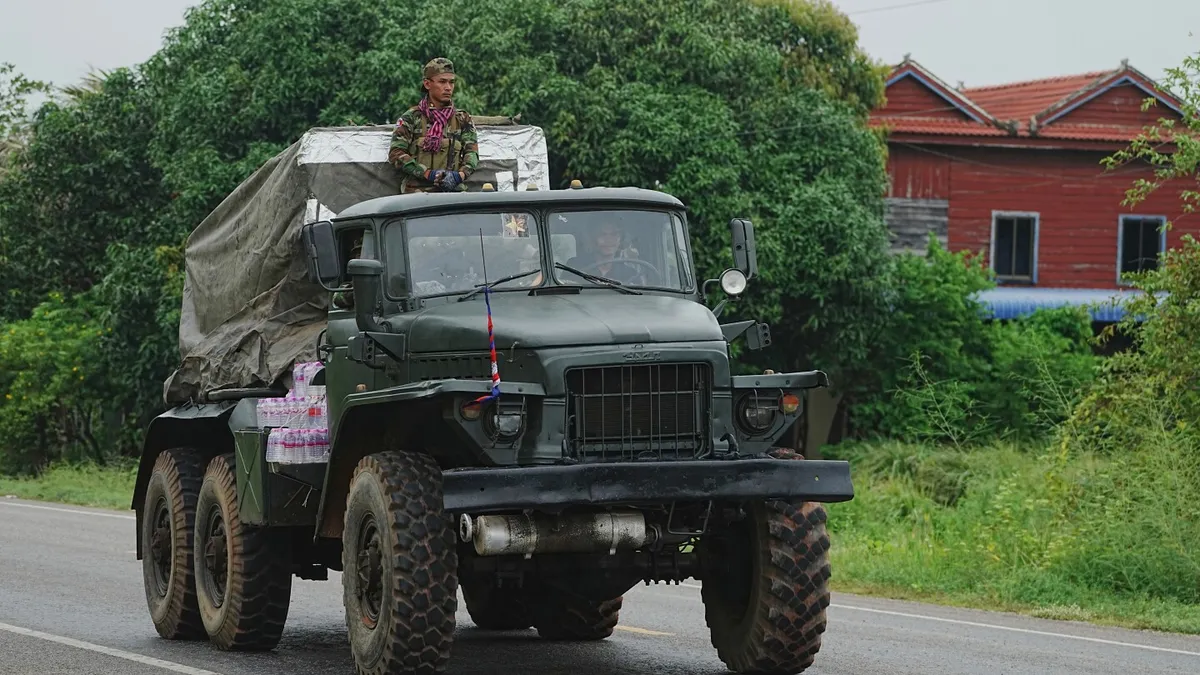
On Sunday, both Thailand and Cambodia expressed their willingness to negotiate a resolution to a deadly border dispute, a situation that has escalated over the past four days. This development comes after mediation efforts by former U.S. President Donald Trump, who highlighted the urgency of addressing the ongoing conflict that has already claimed at least 34 lives and displaced more than 168,000 individuals.
Trump shared on Truth Social that he had conversations with the leaders of both nations, warning that he would reconsider trade agreements with them if the conflict continued. Following these discussions, both Prime Minister Hun Manet of Cambodia and Acting Prime Minister Phumtham Wechayachai of Thailand agreed to meet to discuss a ceasefire.
In a statement on Sunday, Prime Minister Hun Manet announced that Cambodia was in favor of pursuing an “immediate and unconditional ceasefire.” He mentioned that Trump informed him that Thailand was also willing to halt military actions after discussions with Phumtham. “This is positive news for the soldiers and people of both countries,” Manet added, as he assigned his deputy, Foreign Minister Prak Sokhonn, to collaborate with U.S. Secretary of State Marco Rubio and engage with Thailand’s foreign minister to facilitate this ceasefire.
Thailand expressed cautious optimism regarding the ceasefire proposals. Phumtham thanked Trump and stated that Thailand agreed in principle to a ceasefire, but emphasized the necessity of “sincere intention” from Cambodia, according to the Thai Foreign Ministry. He also called for prompt bilateral discussions to outline specific steps toward a peaceful resolution.
Despite these diplomatic overtures, fighting persisted along the contested border on Sunday. Both nations accused each other of escalating the violence, which initially flared up after a landmine explosion injured five Thai soldiers. Following this incident, both countries recalled their ambassadors, and Thailand closed its border crossings with Cambodia.
Colonel Richa Suksowanont, a spokesperson for the Thai Army, reported that Cambodian forces launched heavy artillery into Surin province, targeting civilian homes early Sunday. He also claimed that Cambodia conducted rocket attacks aimed at the ancient Ta Muen Thom temple, a site claimed by both nations. In response, Thai forces utilized long-range artillery to target Cambodian positions. Richa pointed out that Trump’s mediation efforts were a “separate matter,” asserting that actual battlefield operations would persist until Cambodia formally initiated negotiations.
As the conflict continues, the humanitarian situation is dire. Thailand reported an additional soldier's death, bringing the total fatalities to 21, with most casualties being civilians. Cambodia has reported 13 fatalities. Over 131,000 people in Thailand have evacuated to safety, while more than 37,000 have fled from three Cambodian provinces. Many border villages have become deserted, with schools and hospitals shutting down.
Pichayut Surasit, an air-conditioning technician, shared his distress about the outbreak of violence, which forced him to leave his job in Bangkok to protect his family. Currently residing in a shelter in Surin that accommodates around 6,000 evacuees, he expressed concern for his wife and twin daughters, wishing for a swift end to the conflict so they can return home.
Local vendor Bualee Chanduang, who has also sought refuge in the same shelter, echoed hopes for rapid negotiations to conclude the violence. “I pray for God to help that both sides can agree to talk and end this war,” she stated.
The U.N. Security Council has urged the Association of Southeast Asian Nations (ASEAN) to mediate peace talks between the two nations. Additionally, Human Rights Watch condemned the reported use of cluster munitions—prohibited under international law—in populated areas, urging both governments to prioritize civilian safety.
The border between Thailand and Cambodia spans approximately 800 kilometers (500 miles) and has been a source of contention for decades. However, previous confrontations have typically been brief. The latest tensions began in May when a Cambodian soldier was killed, leading to a significant diplomatic rift and domestic political unrest in Thailand.
This ongoing conflict highlights the urgent need for diplomatic engagement and a commitment to human rights as both nations grapple with the implications of war on their citizens.